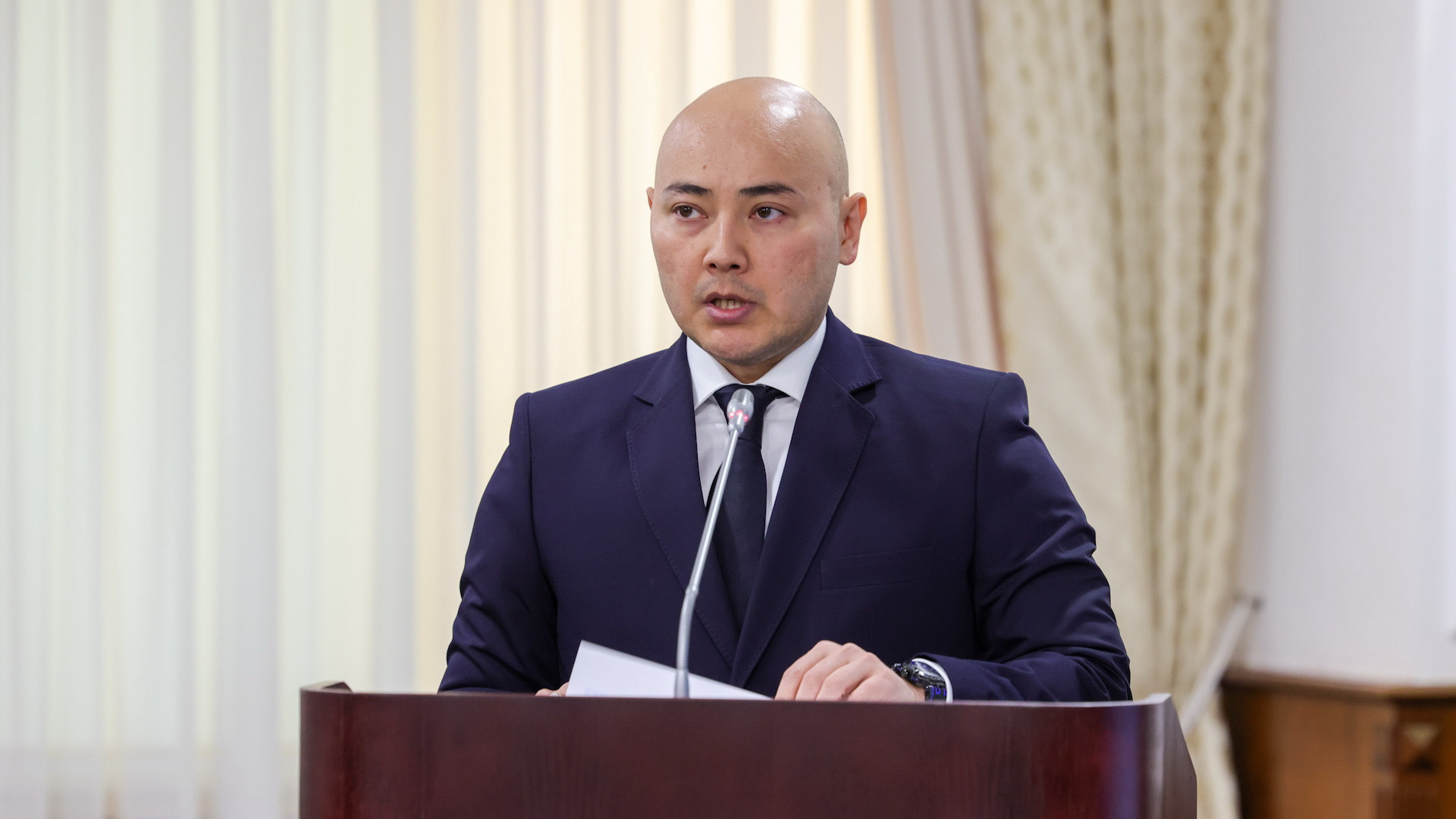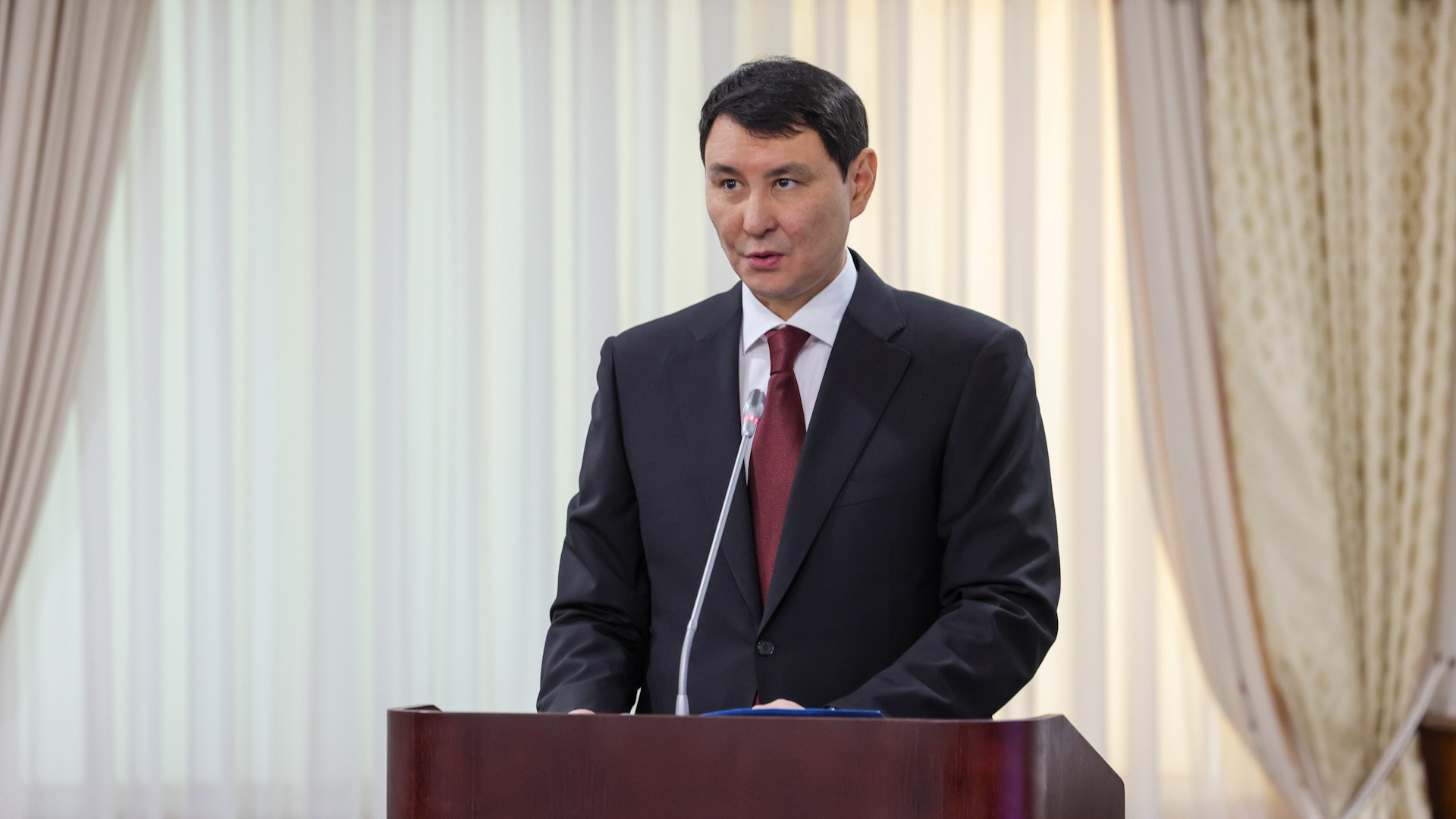10 October 2023, 14:40
 The volume of completed construction works increased by 12.6%. This was announced in the Government by Minister of National Economy Alibek Kuantyrov.
The volume of completed construction works increased by 12.6%. This was announced in the Government by Minister of National Economy Alibek Kuantyrov.
At the meeting chaired by Prime Minister Alikhan Smailov considered the results of socio-economic development of Kazakhstan for 9 months of 2023 and the implementation of the national budget. Deputy Prime Minister - Minister of Finance Yerulan Zhamaubaev and Deputy Chairman of the National Bank of Kazakhstan Berik Sholpankulov made reports on these issues.
Kuantyrov noted that in 9 months, the growth rate of Kazakhstan's economy amounted to 4.7%. Growth in the real sector -- 3.7%, in services - 5.1%. Among the sectors of the most positive dynamics demonstrate construction (growth of 12.6%), trade (by 10%), as well as information and communication (by 8.4%).
Investments in fixed assets grew by 12.1%, most noticeably in transportation and warehousing (59%), trade (37.5%), education (24%), and agriculture (13%). In industry, investments grew by 8.2%, in mining by 4.3%. Regionally, the best indicators are in Mangystau region, Turkestan region, Pavlodar region, and Abay region.
Foreign trade turnover for 9 months increased by 4.2% and amounted to $91.1 billion, exports - $51.2 billion. Exports of processed goods reached $16.2 billion, imports - $39.8 billion. In general, the positive trade balance was $11.4 billion.
According to the minister, the positive rates are maintained in the manufacturing industry, where the volume of production increased by 3.2%. The dynamics is recorded in 14 regions, the largest increase is noted in the city of Almaty and West Kazakhstan, Kostanay, Kyzylorda regions.
In the automotive industry production increased by 41%, electrical equipment in the country produced 30.6% more. Growth was also recorded in food products (3.3%), chemical industry goods (1.5%), metal products (4.2%), beverages (3.2%), plastic products (6.8%) and light industry products (14.6%).
In the mining industry, the volume of production increased by 5.4%. Production of oil in Kazakhstan increased by 8.4%, gas production by 6.1%, and other minerals by 13.9%. Extraction of metal ores decreased by 1.2%, mining services decreased by 1.7%, coal production decreased by 5.7%.
"The volume of completed construction works in Kazakhstan increased by 12.6%. Positive dynamics was recorded in 19 regions, the greatest growth in construction and installation work is noted in Mangystau, West Kazakhstan regions, as well as in the regions of Zhetisu and Abay. For 9 months in the country commissioned 11.7 million m² of housing, which is 11.6% more than the index of the period last year. The highest rates of housing commissioning are observed in Astana, Ulytau, Abay regions, as well as in Kyzylorda region," Kuantyrov said.
In agriculture, the volume of gross output decreased by 9.9%. The Ministry of National Economy explains this by a decrease in the volume of harvest of grain crops, associated with unfavorable weather conditions.
In general, for all 7 economic indicators growth is noted in 5 regions - Abay region, West Kazakhstan region, Kyzylorda region, as well as in the cities of Almaty and Shymkent. The Ministry proposes a number of measures to ensure further growth of the economy:
Food inflation in the country has slowed down to 11.4% by the end of 9 months of 2023. Prices for products are decreasing, in particular, seasonally cheaper fruits and vegetables. The National Bank notes a slowdown in the growth of prices for bakery products and cereals, dairy products, meat and sugar. Nevertheless, monthly food inflation still exceeds the historical average, said B. Sholpankulov.
Non-food inflation is also slowing down (12.1%), as well as the annual increase in prices for personal goods, household goods, building materials and medicines. According to the National Bank, there was an increase in prices for clothing and footwear, medicines, solid fuel, while prices for household appliances decreased. Inflation of paid services slowed down to 11.9% in September. But prices for education services accelerated, rent, transportation and outpatient services became more expensive.
"Annual inflation declined for the seventh consecutive month, its current level is 11.8%. This is taking place in an environment of moderately tight monetary policy and gradual exhaustion of the high base of 2022, lower global inflationary pressures and lower input costs. Monthly inflation has slowed to 0.6%. However, its growth rate is still significantly higher than the historical average," Sholpankulov noted.
Given the overall positive dynamics of inflationary processes, the National Bank decided to reduce the prime rate by 0.5 p.p. to 16%.
Tenge exchange rate in September weakened by 3.4% to 474.99 tenge per dollar. This is attributed to a combination of external and internal factors. First of all, it is the global strengthening of the U.S. currency and increased seasonal demand from importers, associated with the intensification of the cycle of implementation of a number of projects and the development of budget funds.
"The weakening of the tenge exchange rate was also affected by the Government's suspension of the norm of compulsory sale of export foreign currency proceeds of the quasi-government sector and the reduction of the prime rate against the continued tight monetary policy of the US Federal Reserve System. Since the beginning of the year the tenge was supported by sales of currency from the National Fund within the framework of ensuring transfers to the republican budget. In September they amounted to $1 billion 155 m. Inflow of non-residents to the GS market from the beginning of the year amounted to $299 m. Purchase of currency by the EPF in September - $200 m. The National Bank continues to adhere to the flexible exchange rate regime and does not conduct currency interventions," Deputy Chairman of the National Bank of Kazakhstan said.
Gross international reserves at the end of September amounted to $89.7 bln. The National Bank's gold and foreign exchange reserves decreased by 9% to $31.9 bln due to a decrease in the balances of BVU on foreign currency accounts with the NBRK, as well as the payment of government debt.
Assets of the National Fund increased by 3.7% since the beginning of the year, to $57.8 billion. The main growth was due to investment income of 4%, or $2.2 billion.
Transfers from the National Fund to the national budget amounted to 3.3 trillion tenge. For their realization the currency assets of the National Fund were sold for $6 billion. Total revenues to the Fund from the beginning of the year amounted to 3.4 trillion tenge.
Pension assets of the UNPF are showing positive dynamics: since the beginning of the year they increased by 17.7% to 17.2 trillion tenge. The volume of investment income amounted to 1.4 trillion tenge. Pension contributions amounted to 1.5 trillion tenge, and early withdrawals amounted to 196.1 billion tenge.
Deputy Prime Minister - Minister of Finance Yerulan Zhamaubayev in his report reported that the state budget for 9 months received 13.8 trillion tenge of income (the plan was executed by 97%). In the republican budget received 9.2 trillion tenge (89.3% fulfillment).
 According to Zhamaubayev, non-fulfillment of the plan for taxes was mainly due to CIT, VAT on imports, ETP on crude oil and mineral extraction tax. For CIT, this is due to a decrease in the amount of declared advance payments on 292 large taxpayers. The plan for VAT on imports was not fulfilled due to a decrease in imports of certain groups of goods and a reduction in volumes from the EAEU countries (by 6%).
According to Zhamaubayev, non-fulfillment of the plan for taxes was mainly due to CIT, VAT on imports, ETP on crude oil and mineral extraction tax. For CIT, this is due to a decrease in the amount of declared advance payments on 292 large taxpayers. The plan for VAT on imports was not fulfilled due to a decrease in imports of certain groups of goods and a reduction in volumes from the EAEU countries (by 6%).
Non-fulfillment of the ETP on crude oil in the Ministry of Finance is associated with a decrease of 11% in the actual rate. The plan for mineral extraction tax was affected by the decline in prices for major export goods (by 13% on average).
Revenues of local budgets were executed by 116.8% and amounted to 4.7 trillion tenge. The plan was overfulfilled by 669 billion tenge, including 622 billion tenge for taxes. Over-fulfillment occurred in all regions.
"The state budget expenditures were executed by 99.3%, the republican budget by 99.6%, and local budgets by 99.5%. The republican budget expenditures amounted to 16 trillion tenge. Non-fulfillment amounted to 70 billion, 16 billion of which were savings. Not utilized 54 billion tenge," Zhamaubayev said.
According to the Deputy Prime Minister, the largest amounts of non-utilization were formed in the Ministries of Ecology and Natural Resources, Tourism and Sports, Internal Affairs, Emergency Situations. The main reasons are long tendering procedures and procedures for concluding contracts and additional agreements; untimely submission of certificates of completed works, invoices and others.
Expenditures of local budgets amounted to 9 trillion tenge, 49 billion tenge was not fulfilled. This year regions are provided with targeted transfers for about 2 trillion tenge, of which 1 trillion 112 billion tenge was allocated. The funds have been utilized by 98.5%. 17 billion tenge was not executed (including savings of 1 billion tenge), 16 billion tenge was not utilized. The largest amounts were formed in Astana, Mangystau region, Atyrau region and Karaganda region.
Yerulan Zhamaubayev reported that in Kazakhstan this year, desk control covered more than 353,000 procedures of public procurement for the amount of 10 trillion tenge. Identified violations of 47,129 procedures, the objects of state audit executed 93% of notices of elimination.
1,700 audit activities were conducted, covering more than 1.2 trillion tenge of budget funds. As a result, financial irregularities for 194 billion tenge were identified, most of which were eliminated (158 billion tenge). 1,724 recommendations were given to improve and increase the efficiency of audit objects.
According to the Ministry of Finance, the Comprehensive Privatization Plan for 2021-2025 provides for the implementation of 658 objects. To date, 372 objects have been sold and transferred to trust management with the right of subsequent redemption. Of these, 33 are at auction, 64 are sent for reorganization and liquidation, 189 objects are at the stage of pre-sale preparation.
#Economy #Government session #Ministry of National Economy #Yerulan ZhamaubayevStay updated about the events of the Prime minister and the Government of Kazakhstan - subscribe to the official Telegram channel
Subscribe